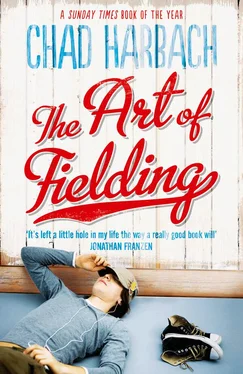1 ...7 8 9 11 12 13 ...27 “What does he do during games?”
“He chokes.”
That afternoon, the Harpooners played the Lions of Vermont State. DON’T CROSS THE STATE LIONS, read one long-traveled mother’s sign. Henry sat in the dugout between Owen and Rick O’Shea. Starblind had already been penciled into the starting lineup, as the center fielder and leadoff hitter.
Owen took a battery-powered reading light from his bag, clipped it to the brim of his cap, and opened a book called The Rubáiyát of Omar Khayyám. Henry and Rick would have found themselves doing shuttle drills and scrubbing helmets if they’d even thought about reading during a game, but Coach Cox had already stopped punishing Owen for his sins. Owen posed a conundrum where discipline was concerned, because he didn’t seem to care whether he played or not, and when screamed at he would listen and nod with interest, as if gathering data for a paper about apoplexy. He jogged during sprints, walked during jogs, napped in the outfield. Before long Coach Cox stopped screaming. In fact, Owen became his favorite player, the only one he didn’t have to worry about. When practice was filled with miscues, as it usually was, he would whisper mordant remarks to Owen from the corner of his mouth. Owen didn’t want anything from Coach Cox — not a starting job, or a better spot in the batting order, or even any advice — and so Coach Cox could afford to treat him as an equal. Much the same way, perhaps, that a priest appreciates his lone agnostic parishioner, the one who doesn’t want to be saved but keeps showing up for the stained glass and the singing. “There’s so much standing around,” Owen said when Henry asked him what he liked about the game. “And pockets in the uniforms.”
By the sixth inning against Vermont State, Henry could barely restrain his restlessness. “Kindly desist,” Owen said as Henry’s knees jittered and twitched. “I’m trying to read.”
“Sorry.” Henry stopped, but as soon as he turned his attention back to the game his knees started up again. He flipped a handful of sunflower seeds into his mouth and precision-spat the splintered shells into a little pool of Gatorade on the floor. He turned his hat backward. He spun a baseball in his right hand and flipped it to his left. “Doesn’t this drive you nuts?” he asked Rick.
“Yes,” Rick said. “Cut it out.”
“No, not me. Sitting on the bench.”
Rick tested the bench with both palms, as if it were a floor-sample mattress. “Seems okay to me.”
“Aren’t you dying to be out there?”
Rick shrugged. “Two Thirty’s only a junior, and Coach Cox loves him. If he does half of what he’s capable of, I’ll be spending the next two years right here.” He looked at Henry. “You, on the other hand, have Tennant worked into quite a lather.”
“I do not,” Henry said.
“Yeah, sure. You didn’t hear him blabbing at Meccini last night while I was lying in my cot, pretending to be asleep.”
“What’d he say?”
Rick looked both ways to make sure no one else was listening, then segued into his Tennant impression. “Bleeping Schwartz. Can’t stand the fact that I’m the captain of this bleeping team. So what does he do? Digs up that little piece of bleep who catches every bleeping thing you hit at him, that’s what. Then trains the little bleep night and day, and proselytizes Coach Cox all bleeping winter about what a fantastic bleeping player he is. Why? So the little bleep can steal my bleeping job, and Schwartz, who’s only a bleeping sophomore, for bleep’s sake, can declare himself the bleeping king of the team.”
Owen looked up from his book. “Tennant said proselytize?”
Rick nodded. “And bleeping.”
“Well, he has reason to fear. Henry’s performance has been outstanding.”
“Come on,” Henry protested. “Tennant’s way better than me.”
“Lev can hit,” Owen said. “But his defense is slipshod. He lacks the Skrimshander panache.”
“I didn’t realize Tennant disliked Schwartzy so much,” said Henry, by which he meant, I didn’t realize Tennant disliked me so much. No one had ever called him a little bleep before. He’d noticed that Lev treated him coldly during drills, but he’d chalked this up to simple indifference.
“What, you live under a rock?” Rick said. “Those two can’t stand each other. I wouldn’t be surprised to see things come to a head pretty soon.”
“Verily,” Owen agreed.
The game was tied in the ninth, Tennant on first base, when Two Thirty stepped to the plate. He screwed his back foot into the dirt, lifted his bat high above his head. Already today he’d hit a single and a double. Maybe Argentina had done him some good.
“Jim Toover!” Owen cheered. “You are skilled! We exhort you!”
Ball one. Ball two.
“How could anyone miss that strike zone?” Rick asked.
Ball three.
Henry looked toward third base to see if Coach Cox would put the take sign on. “Letting him swing away,” he reported.
“Really?” Rick said. “That sounds like a bad i—,” but his words were interrupted by an earsplitting ping of ball against aluminum bat. The ball became a speck in the pale-blue sky and carried deep, deep into the parking lot. Henry thought he heard a windshield shatter, but he wasn’t sure. They rushed from the dugout to greet Jim at home plate.
Rick shook his head in astonishment. “Now I’ll never get off the bench.”
“Indeed!” Owen gave Two Thirty a celebratory smack on the ass with his Omar Khayyám. “Indeed!”
With that win the Harpooners, for the first time in anyone’s memory, including Coach Cox’s, were undefeated. They celebrated at the all-you-can-eat Chinese buffet in the strip mall near their motel. Then, over the next three days, they lost their next five games. Tennant was booting every grounder that came his way. Two Thirty struck out repeatedly. As the losses mounted, Coach Cox stood in the third-base coaching box with crossed arms, digging a moat in the dirt with the toe of his cleat and filling it with a steady stream of tobacco juice, as if to protect himself from so much ineptitude. The mood in the dugout turned from optimistic, to determined, to gloomy, to gloomy with a venomous edge. On the bench during their seventh game, Rick hid his phone in his glove and surreptitiously scrolled through the Facebook photos that their classmates had posted that day from West Palm, Miami, Daytona, Panama City Beach — album after album of bikinied girls, blue ocean, brightly colored drinks. “So close,” he moaned, shaking his head. “But so, so far away.”
“Owen,” Henry said excitedly, “I think Coach wants you to hit for Meccini.”
Owen closed The Voyage of the Beagle, on which he had recently embarked. “Really?”
“Runners on first and second,” Rick said. “I bet he wants you to bunt.”
“What’s the bunt sign?”
“Two tugs on the left earlobe,” Henry told him. “But first he has to give the indicator, which is squeeze the belt. But if he goes to his cap with either hand or says your first name, that’s the wipe-off, and then you have to wait and see whether —”
“Forget it,” Owen said. “I’ll just bunt.” He grabbed a bat, ambled to home plate, nodded politely at Coach Cox’s gesticulations, and pushed a perfect bunt past the pitcher. The shortstop’s throw nipped him by a quarter step, and Owen trotted back to the dugout to receive congratulations from his teammates. This was Henry’s favorite baseball custom: when a player hit a home run, his teammates were at liberty to ignore him, but when he sacrificed himself to move a runner, he received a long line of high fives. “Sweet bunt,” Henry said as he and Owen bumped fists.
“Thanks.” Owen picked up his book. “That pitcher’s not bad-looking.”
Читать дальше










